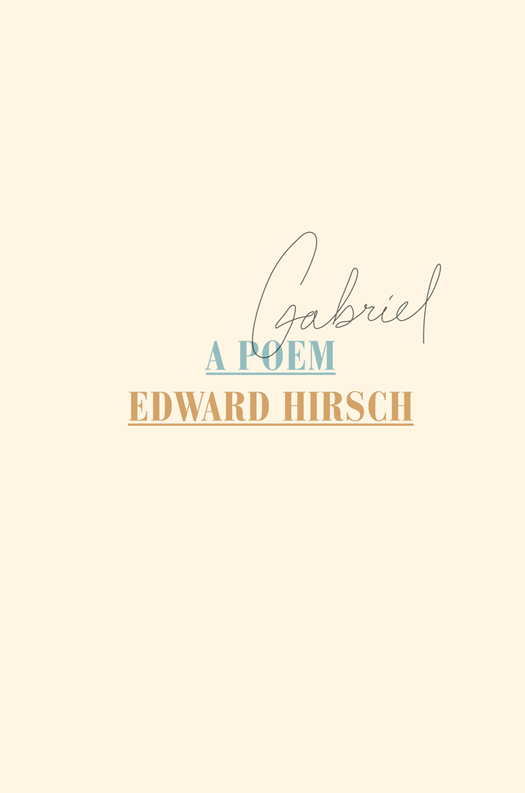
Gabriel
A Poem
کتاب های مرتبط
- اطلاعات
- نقد و بررسی
- دیدگاه کاربران
نقد و بررسی

July 21, 2014
MacArthur fellow and Guggenheim Foundation president Hirsch (The Living Fire) writes the kind of poem that no poet should ever have to: a near-unforgettable book-length verse memoir describing the life and death, the rambunctious childhood, the adventurous youth, the funeral, and the enduring memory, of the poet’s only son. As a baby, Gabriel “was a trumpet of laughter/ And tears who did not sleep/ Through the night even once.” As a child, he had behavioral disorders that made him hard to handle: “He was trouble/ But he was our trouble.” Gabriel found some happiness—and some equally wild friends—as a young man in New York, but ventured out “during a rainstorm” (apparently Hurricane Irene) “And never came home.” Hirsch mixes in his own reflections on other writers’ mourning for the children they outlived (Wordsworth, Mallarme, Mahler) without robbing his memoir of its momentum, nor his outcry at the cosmic injustice when a parent outlives a child. After all the set pieces (the coroner’s report, the rituals of Jewish mourning), Gabriel’s tumultuously charming personality comes through: “He loved twisting rides on roller coasters/ Coins fell from his pockets/ When he was upside-down.” Unpunctuated, unrhymed triplets serve Hirsch’s grief and tell his story well: even readers left unmoved by Hirsch’s earlier offerings may have to reckon with this one.

Starred review from September 15, 2014
This book-length elegy recounts the brief yet turbulent life of the poet's adopted son, Gabriel, from his infancy to his sudden, tragic death at age 22. A brilliant but rambunctious child given to severe mood swings, Gabriel was beset by a cluster of developmental disorders ("He had reasons why/ Reason disobeyed him") and consequently fell victim to self-destructive behaviors, medications, and a parade of therapists and social workers. In an unbroken sequence of measured, unpunctuated tercets, Hirsch (The Living Fire) traces the emotional vortices and ripples of caring for his uncontrollable yet beloved son as well as "the work of mourning" that commenced after his death. Drawing inspiration and sustenance from other literary fathers who outlived their offspring (Victor Hugo, Rabindranath Tagore, Ben Jonson), he constructs a personal history of grief that admits the full range of parental experience, from joy to anger to frustration to guilt to regret. VERDICT An artful, however, eminently readable poetic narrative, this collection captures "The evening with its lamps burning/ The night with its head in its hands" and the many difficult days that follow as vividly and as effectively as any prose memoir.--Fred Muratori, Cornell Univ. Lib., Ithaca, NY
Copyright 2014 Library Journal, LLC Used with permission.

Starred review from August 1, 2014
Hirsch's poetry (The Living Fire, 2010) is rooted in his exceptional fluency in poetic traditions, showcased in his glorious A Poet's Glossary (2014), a landmark workas is this, his most personal creation to date, an elegy of such artistry and candor that any reader, including those leery of poetry, will read it with rising awe. Hirsch masterfully tells the grueling, sometimes funny, and, finally, tragic story of the life and death of his son, Gabriel, in a commanding and propulsive book-length poem. Written in tercets (three-line stanzas) bereft of punctuation, Gabriel takes us through a childhood brutally hijacked by strangely tumultuous brain chemistry and the torments of cruelly tested parenthood. Hirsch re-creates the hectic urgency of a boy in perpetual motion and ceaseless anxiety, describing Gabriel's quicksilver moods, love of action and wheeling and dealing, wildly inventive humor, and insistence on being his impossibly unconventional and inconvenient self. Hirsch anoints his rampaging son King of the Sudden Impulse / Lord of the Torrent / Emperor of the Impestuous, looks to other poets who lost children, and presents an explicit case study of his son's diabolical illness and attempted treatments. Hirsch's lightning-lit portrait of and surging lament for his hurricane of a son is a courageous, generous, and reverberating epic of fatherly love and mourning.(Reprinted with permission of Booklist, copyright 2014, American Library Association.)

























دیدگاه کاربران